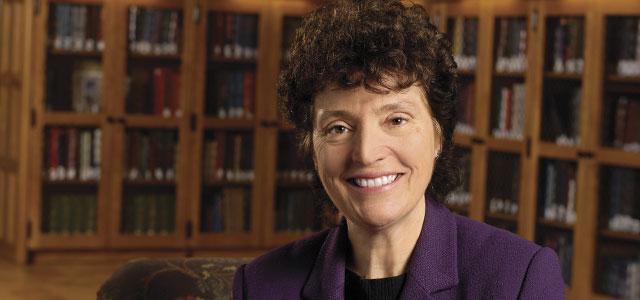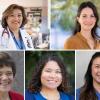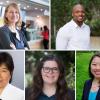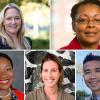
Barbara Koenig has returned to UCSF as a professor in the School of Nursing’s Institute for Health & Aging (photo courtesy of the Mayo Clinic).
The Ethics Evangelist
As a young pediatric nurse in a Minnesota hospital in the early 1970s, Barbara Koenig became acquainted with the constellation of new technologies designed to save children’s lives.
Positive pressure ventilators, previously limited to operating rooms, were among the new innovations that became standard features of ICUs and neonatal intensive care units (NICUs). Some of Koenig’s patients in the NICU were premature infants with severe neurological damage or necrotizing enterocolitis. They couldn’t survive outside the hospital.
“There were long nights spent working desperately to keep a particular child alive, and the technology was so intense that it would take two of us to manage it,” says Koenig. The infant might be on dialysis or an ECMO (extracorporeal membrane oxygenation) machine, which provides respiratory and cardiac support to a severely damaged heart or lungs. Koenig and her colleagues also had to offer support to terrified parents.
“The imperative was to keep going, even when it was clear that these measures were not going to be successful,” Koenig says. “We had these constant struggles over whether we were doing the right thing.”
In the ensuing four decades, Koenig, who describes herself as a “professional worrier,” has worked at the forefront of ethical dilemmas in science, including those related to the sequencing of the human genome. Today she is an internationally renowned expert in bioethics, the study of controversial social and legal questions created by advances in biomedicine. She launched that career in the Bay Area by earning a PhD in the medical anthropology program offered jointly by UCSF and UC Berkeley.
Koenig pioneered the use of research-based social science methods and real-world practices to study questions surrounding end-of-life care, informed consent, cultural considerations in medical treatment, the biology of race and the ways genetic science can be used – or abused – in the name of improving health care for individuals.
Now she is back at UCSF as a professor in the School of Nursing’s Institute for Health & Aging. Her return follows leadership roles in bioethics at Stanford University and the Mayo Clinic. She has also published widely, lectured internationally and served as a faculty scholar for the Project on Death in America, funded by the Open Society Institute, and on national boards, such as a cabinet-level advisory panel on genetic testing in the Clinton administration.
Back at UCSF, she will continue her wide-ranging research while helping the university launch initiatives to strengthen ethical inquiries across its four professional schools. With Dan Dohan, a sociologist with UCSF’s Philip R. Lee Institute for Health Policy Studies, and Associate Vice Chancellor Elizabeth Boyd, she will also help develop ethical guidelines for a new biobanking project to obtain, process and share biological specimens at the five UC medical school campuses.
“I have such deep connections with the campus that it is a delight to be back,” Koenig says.
Sharon Kaufman, a professor at the Institute for Health & Aging and chair of the medical school’s Department of Anthropology, History and Social Medicine, helped engineer Koenig’s return to UCSF. The two were in graduate school together.
“Because of her innovative approach to thinking about the breadth of ethics in medical, scientific and social matters, and her extraordinary work, collaborative spirit and colleagueship – I urged her to return here,” Kaufman says.
Starting to Ask Questions
Back when Koenig was a nurse, conversations were starting to take place about the benefits and burdens new technologies placed on patients, families, hospital staff and society. With her concern for patients and her innate curiosity about larger moral and philosophical questions, the Minnesota native wanted to contribute to those conversations and “sort out the really complicated dilemmas” she had experienced as a nurse.
The nursing profession was encouraging its members to pursue advanced degrees. Koenig had shown an academic bent with her choice of undergraduate studies at the University of Minnesota. In addition to nursing, she majored in history, focusing on Asia, to better understand the Vietnam War in its historical and cultural context.
When she came to the Bay Area as a graduate student, medical anthropology was a new interdisciplinary program that incorporated humanities with studies into health, epidemiology and the history of medical care. The program allowed Koenig to investigate the larger theoretical questions while adhering to her interest in anthropology, cultural context and patient care practices.
“In American academia, ethics is really owned by philosophy, and I work with a lot of moral philosophers who have been really important in my career,” she says. “But I’m really a social scientist in the way I approach these issues. I’m very much focused on the patient experience.”
A Unique Path
After earning her doctorate in 1988, she carved out what she describes as a “unique” career path in which she researched, taught and eventually became the resident ethics expert, “embedded” at medical schools and centers, first at UCSF. She was also determined to stay in the Bay Area because she and her husband, San Francisco State University English professor Stephen Arkin, who later became the English department chair, were raising a son and daughter in a house not far from the Parnassus campus.
Her career also kept her busy with off-campus commitments, including forming the ethics policies for Laguna Honda Hospital and authoring guidelines for the California Nurses Association on nurses’ roles in assisted suicide and using anencephalic infants as organ donors.
Staying in the Bay Area brought new opportunities when in 1993 she went to Stanford University, which in the early 1990s was known for its pioneering research in molecular genetics.
Over the next 13 years, Stanford allowed Koenig to take her inquiring mind into the new frontier of genomics. With colleagues, she established the university’s Program in Genomics, Ethics, and Society, drawing on scholars throughout Stanford and the community to investigate the social, ethical and legal implications of innovations arising from human DNA sequencing. The group examined many issues, including whether it would help people to know they carried genes associated with certain diseases, such as breast cancer, ovarian cancer and Alzheimer’s disease.
After investigating the APOE gene, which is associated with late-onset Alzheimer’s, Koenig and her colleagues concluded that knowledge wasn’t necessarily power. That’s because scientists hadn’t established with any certainty that having a form of this gene meant someone was likely to develop Alzheimer’s – unlike a “classic” genetic disease such as Huntington’s disease, where having a certain genetic defect is essentially the equivalent of having the disease.
Questions of Race
Koenig’s other major achievement at Stanford was to focus interdisciplinary attention on questions of race and genomics. The result was the 2008 book Revisiting Race in a Genomic Age, a collection of essays Koenig co-edited on the revival of scientific and public policy inquiries into race, its origins and its role in health care.
As science has focused on genetic sources for disease, including social and behavioral conditions like addiction, Koenig noted a corresponding focus on race – which she calls a socially constructed category defined as much by cultural traditions as biology. In the introduction to the book, she wrote that human genome sequencing showed humans are “essentially the same” – 99 percent genetically identical.
Nonetheless, the search for racial differences continues to guide research agendas and public and private sector investment, Koenig argued. For the book Koenig contributed an essay describing her own research on race and addiction studies. She found a disturbing trend among scholars and public health experts: looking for race-based genetic predispositions to explain why people develop alcohol and drug problems.
She likened such inquiries to the old “firewater” myths that asserted Native Americans were biologically vulnerable to alcoholism. While Koenig said she doesn’t advocate cessation of genetic research on addiction, she wrote, “Focusing only on the genetics or biology of addiction may shift attention from known environmental and social causes of drug use.”
Koenig’s conclusion on addiction supported other concerns raised by the Stanford project: the potential of race-based research to create misleading ideas about identity and to divert attention from developing truly effective strategies to reduce health care disparities and to personalize medicine to people’s individual biology. Developing these strategies is a top priority in health care today.
New Dilemmas
When she accepted an offer to return to Minnesota in 2005, after her younger child had graduated from high school, Koenig continued to challenge assumptions about end-of-life care – asserting, for example, that living wills and other documents don’t necessarily resolve difficult choices for patients and families – as well as about genomics and race.
She went to the Mayo Clinic to create a new program in biomedical ethics research. There she focused on another dilemma created by innovations in genetic science: What happens when researchers, studying the genes of patients, uncover markers indicating risks for other illnesses? Should they tell those patients, who never could have imagined the range of potential results when they agreed to participate in the original research? Do their relatives have a right to know, even if the research subject is dead?
The issue came up at the Mayo Clinic when researcher Gloria Petersen found that 73 of 2,000 patients enrolled in a study of pancreatic cancer also had genetic mutations predisposing them to melanoma and several other diseases, according to the New York Times. While most of those 73 patients had died, questions arose over whether their relatives, who potentially share the same predispositions, should be informed. One complicating factor was that the research subjects’ consent forms didn’t address whether they wanted those results shared with family.
Koenig, along with Susan Wolf, a professor of law at the University of Minnesota, is working on a five-year project to study the effects of sharing those results with families. The study involves a major survey and in-depth interviews with patients and relatives, engaging them in questions designed to encourage reflection on the personal, social and legal implications of receiving such results.
Returning Home
Koenig has continued working on this study, even as she packed her books and files and returned to San Francisco. She now occupies a third-floor office in the Institute for Health & Aging’s headquarters at the Laurel Heights campus. As of December, some boxes remained unpacked in her office.
In addition to shuttling between San Francisco and Minnesota, she spent several months in early 2012 as a visiting scholar of the Fondation Brocher, in Geneva, Switzerland. There she worked on several projects related to her work in genomics, including a personal narrative that arose from her experience with “direct-to-consumer” genetic testing, which has attracted attention from policymakers, the scientific community, the media and laypeople who want personal genetic risk information.
Koenig submitted saliva samples to two companies that market their testing services online. One is 23andMe, a Mountain View-based company founded by Anne Wojcicki, wife of Google co-founder Sergey Brin.
23andMe’s retail DNA test was named Time magazine’s 2008 Invention of the Year; the company boasts on its website that it can help people make better health choices by uncovering increased genetic risks for diabetes, macular degeneration, Parkinson’s disease and 100 other conditions. 23andMe, which charges just $99, also offers information to help customers trace their genetic ancestry and track down long-lost relatives – including biological parents for adopted children.
A retail product like 23andMe gives a professional worrier like Koenig plenty to question. In addition to the legal and social implications of a service that wades into the emotionally messy tangle of broken family relations, Koenig also wonders if the “market for these products is getting ahead of the regulatory vetting.” She considers the information she received about her possible risks for certain diseases to be too imprecise to be of much use.
Most interesting to Koenig, considering her concerns about race dictating medical agendas, is that she learned she is a carrier of a genetic trait for sickle cell disease, which is much more common in people of African and Mediterranean descent. “This was totally amazing and unexpected, because I’m from the heart of the Midwest and have four grandparents from Europe. The irony is that having worked on all this stuff about race and genetics, I find out that I’m a carrier of one of the most racialized of all diseases.”
New Initiatives at UCSF
When asked how many projects she is working on, Koenig laughs: “Too many.”
But her eyes brighten and she talks excitedly about any one of them. She’s looking forward to helping create ways for different researchers at the UCSF schools to network on ethical issues. She is also participating in EngageUC (Engaging University of California Stakeholders for Biorepository Research), a program to address consent and privacy issues involved in the UC medical centers’ building research repositories of biological specimens.
Koenig will help organize community forums in Northern and Southern California to bring together people from diverse backgrounds to share their questions and concerns about biobanks. Koenig was involved in a similar effort on biobanking, known as deliberative community engagement, at the Mayo Clinic.
“We get a group of citizens together, give them a lot of background material on what is a biobank, what are the risks, what are the issues of race, what protections are currently in place, and then you ask them to give advice.” She adds: “It was one of the most fun things I’ve ever been involved in.”
The Basic Question
All of the many questions Koenig asks in her research revolve around one basic idea: what it means for people to be well informed and to exercise choice, whether they are patients, caregivers or consumers of services like 23andMe.
When Koenig was a nurse, she cared for a 13-year-old boy who was dying of a rare tumor. “I remember him vividly. He had the most beautiful red hair,” she says.
His doctor left orders that she and other nurses were not to talk to him about his prognosis, even if he initiated the conversation. Koenig says, “Imagine an adolescent who can see he’s so sick, he knows he’s not going to get well, but you’re told by the person in charge that you’re not allowed to talk to him about the fact he’s not likely to survive.”
At the time, Koenig was frustrated that no one was talking about what it meant for the boy’s emotional or physical well-being to not receive information from his nurses or have them acknowledge his condition.
Now we live in an age of information overload, when patients can research their medical conditions online, and the public clamors for full disclosure about pretty much everything.
Koenig also notes that medicine is becoming increasingly commodified, with one consequence being that drug companies, medical centers and genetic testing companies use generous marketing budgets to inundate the public with positive messages about their services.
“If you ask the average American, ‘Do you want more information,’ there is usually just one answer. It’s yes, but the answer is usually not very reflective,” she says. “Some people with a pure libertarian viewpoint would argue, ‘This is just fabulous that we have all this information. We’ll just throw it all out there in the marketplace, and everyone can purchase anything they want.’”
But there are consequences to getting too much information, or making too much information widely available. In late January, Koenig raised concerns when interviewed by the New York Times about the privacy rights of people participating in an international study in which they agreed to allow their genetic information to be posted online. A genetics researcher was able to identify five of those study subjects with limited bits of data, including strings of DNA letters. “I’ve been worried about this for a long time,” Koenig told the Times.
There’s also the problem of people getting information in a form that’s not helpful, Koenig says. “It all gets back to being a nurse. We don’t want to tell people what to do, but if you want to enable them to make good choices for themselves, you have to know how to make sure they have the information they need and in a form they can understand.” And if the information produces life-changing consequences, “We need to make sure people get the support they need,” Koenig adds.
Koenig has devoted her career in bioethics to developing procedures and practices that honor patient choice. That’s true with her work in end-of-life care and in genetics, where her new projects focus on helping the public deal with the huge amounts of data coming in from research on the genome.
Choice by itself is not necessarily a “good,” she says. “You also need to make sure it is a meaningful one.”



